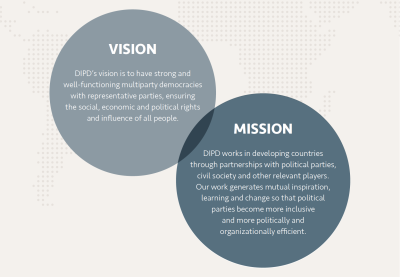About DIPD
DIPD is a community of parties in the Danish parliament, who believe we can make a difference to the development of democratic societies in the world.

The Danish democratic tradition is strong, and Danish parties hold extensive knowledge of how to develop and promote democratic institutions in political systems. The basic idea of DIPD is that by working together and learning from each other's experiences, we can achieve better results for the benefit of democracy than if we work in isolation.
Well-functioning and democratic political parties are a prerequisite for the development of well-functioning, representative multi-party democracies. Democratic political parties are the best guarantee of freedom, prosperity, stability, equality and peace.
The need to support actors who want to fight for democracy has not been this urgent since the fall of the Berlin Wall.
On the threshold of the 2020s, many are concerned about the future of democracy globally. There are conflicts and challenges even in the most well-established democracies. The V-Dem Institute reports that in 2020, for the first time in 20 years, there will be more autocracies than democracies in the world. International IDEA documents that although the number of democracies has been steadily rising for many years, the global state of democracy has been deteriorating in recent years: the quality of both new and old democracies is declining.
In some countries the parties, instead of being engaging organizations that mobilize citizens and give them a voice, are evolving towards becoming person-driven campaign machines that primarily activate citizens when they are needed at the ballot box. Ethnic and geographical conflicts overshadow the development of long-term political solutions, and populist parties seem to have gained a permanent foothold. Both women, young people and vulnerable groups in society continue to be under-represented both in positions of trust in the parties and at all levels of elected positions.
DIPD was established by law in 2010. The purpose of DIPD is to strengthen Danish democracy assistance, in particular support for the development of political parties and multi-party systems in developing countries.
There is, however, reason for hope. Protest movements are growing out of continued repression, and the climate crisis is inspiring a new democratic commitment worldwide. At the same time, the MeToo movement is actualizing an increased focus on equality and the distribution of power - also internally in the political parties.
This is the reason why DIPD has an important role to play. Denmark also has challenges with trust in politicians, the popular commitment and inclusivity in the parties. But we still stand on a solid platform. Based on 170 years of democratic history and with important democratic experiences rooted in the political parties, DIPD can convey inspiration, ideas and support to political parties, movements and other actors in the world. By supporting the development of democratic political parties and a democratic culture, we support the development of democracy.

4 principles for our work
1. We work for parties and democracy
DIPD’s understanding of democracy is based on the Danish political model: a representative multi-party democracy. The political parties are the key players who together ensure long-term, sustainable political solutions.
DIPD works for political participation through voluntary involvement in political parties. Voluntary engagement is the foundation of the political parties and must be maintained, supported and expanded.
2. We work in partnerships
DIPD's work is partnership-based. We insist on equality in the partnerships. Both parties contribute to the partnership with knowledge, experience and resources. The goals and purposes of the partnership itself are always formulated jointly.
DIPD has respect for the partner organizations, their independence and the political and societal context in which they operate. These are dynamic contexts that often change; it requires flexibility, trust and openness in the relationship between the partners.
3. We work rights-based and for sustainable solutions
Democracy presupposes human rights. Therefore, DIPD works rights-based and purposefully to strengthen and safeguard these rights.
We work with the UN's Millenium Goals with a focus on no one being left in the lurch, and on economic, social and environmental sustainability.
DIPD works for equality and fights all forms of violence and harassment in political work with a special focus on violations against women.
DIPD has a policy of zero tolerance for corruption in all its forms, and has an institutionalized anti-corruption policy and a whistleblower system.
4. We support women and youth as agents of change
Young people and women are systematically under-represented when decisions are made. This excludes both half the population and those, whose future is decided, from influence. That is why DIPD works purposefully to ensure that young people and women are heard, represented and offered a place at the table. Whether it is in the political parties, in debates or in the parliaments of the world.
5 strategic targets for 2021-2025
1. Political parties formulate and communicate political solutions
DIPD will work to ensure that political parties in developing countries formulate political solutions to significant challenges and that they engage in dialogue with citizens and communicate their policies.
2. Political parties are inclusive and engaging organizations
DIPD will work for more inclusive and engaging political parties. Engaging citizens and securing political influence is a core task for political parties, and DIPD supports democratic representation through political parties. This is done, among other things, by working purposefully with gender equality, young people in politics, ethnic and geographical representation.
3. Political parties are democratic organizations
DIPD will work to ensure that political parties in developing countries are well-organized, transparent and internally democratic, with an active member democracy at local and national level.
4. Political parties participate in cross-party cooperation and dialogue
DIPD will work to promote cross-party cooperation and dialogue between political parties in developing countries. We will also work to promote dialogue between these and Danish parliamentary parties in order to contribute to well-functioning multi-party democracies.
5. DIPD will learn from and document our results
To support the first four goals, DIPD will base its work on learning and systematically document and disseminate its results.